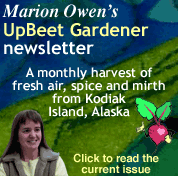
gardening are darn good ideas
By Marion Owen, Fearless Weeder
for PlanTea, Inc. and
Co-author of Chicken Soup for the Gardener's Soul
FEATURE ARTICLE:

Tom Hanks' "Power of Four" solution
More good stuff:
Who is Marion Owen?
FAQs about PlanTea
Search Marion's articles, tips and recipes
Why grow organic?
News and press releases
Read love letters
How to link to this site
Need a speaker?
How to contact Marion
Visiting Alaska?
Come to Kodiak Island!
Go to home page

Marion's UpBeet Gardener
Newsletter has been
replaced by Marion's blog
which you can find at:
www.marionowen.wordpress.com

Coke vs. Pepsi, Toyota vs. Ford, organic fertilizers vs. chemicals. Tug-of-wars like these are hot and ongoing. No one can declare a clear victory. Gardeners are no different. They're comfortable discussing tomato varieties and the best time to plant peas and mow lawns.
Yet there's one topic that polarizes gardeners faster than a snowstorm in May: fertilizers. Which are better, organic fertilizers or chemical ones? Can plants tell the difference? Furthermore, would we really starve if it weren't for agri-chemicals? Finally, is there a place for organic gardening in today's world?
Thought I teach organic gardening courses through the University of Alaska and support the virtues of organic fertilizers in interviews, seminars and presentations, I'm going to step aside and present viewpoints from other individuals, as well as provide snippets from government reports, resources, and links. Let's start with Nell Newman, daughter of Paul Newman and Joanne Woodward . . .

Nell Newman is head of Newman's Own Organics, a division of her father's food company which she started in 1993. Nell traces her interest in organic agriculture to her childhood in rural Connecticut, where she grew up in the woods in an old farmhouse. "I knew where food came from because I had a connection to what we ate. I grew it and picked it, or caught it and cleaned it."
 Though
serious about organic food, Nell tries to win people over gently. "It's
a fine line between educating and proselytizing," she says. "It's a different
tone. And I usually don't listen when people proselytize to me."
Though
serious about organic food, Nell tries to win people over gently. "It's
a fine line between educating and proselytizing," she says. "It's a different
tone. And I usually don't listen when people proselytize to me."
This gentle style is the key to her company's success. "We want to offer organic food products with wide consumer appeal," says Nell. "That was the motivation for the motto, 'great-tasting products that happen to be organic,' because then you don't have to convert people to some whole other way of thinking. People don't change so easily. If it tastes like a hot dog or tastes like a pretzel, they'll buy it and enjoy it without having to be convinced. And then perhaps they'll come around to the organic thing and say, "Well maybe it is a good thing."
-- Nell Newman, head of Newman's Own Organics from a September 1999 interview in Conscious Choice The Journal of Ecology and Conscious Living

"What can be more valuable now than a small garden, free of synthetic fertilizers and pesticide poisons, yielding food that tastes as good as the vegetables and fruits we were able to buy in markets years ago? Valuable not only to the body but to the spirit."
-- Robert Rodale
(1930-1990)
and Chief Executive Officer of Rodale
for nearly twenty years
 "To
test the benefits of organic gardening, I constructed two identical raised
beds. Both began with carefully prepared soil and were planted with seeds
and seedlings from the same source. I tended one bed organically, using
compost for fertility. On the other, I used that well-known blue synthetic
fertilizer. I did not use pesticides of any kind on either bed. In both
beds, I controlled pests by hand-picking and by hosing off the plants.
"To
test the benefits of organic gardening, I constructed two identical raised
beds. Both began with carefully prepared soil and were planted with seeds
and seedlings from the same source. I tended one bed organically, using
compost for fertility. On the other, I used that well-known blue synthetic
fertilizer. I did not use pesticides of any kind on either bed. In both
beds, I controlled pests by hand-picking and by hosing off the plants.
The non-organic bed had an initial burst of growth, but it seemed to attract aphids and ants. The plants in the organic bed soon caught up and surpassed the chemically fertilized plants and had far fewer pest problems. Also, in the chemical bed, the pH increased a great deal, so I must now lower it.
I harvested more and better veggies from the organic bed, and I continue to say, 'Those who know, garden organically; all others can be taught.'"
-- Doug Moore, Cottonwood,
Arizona
in a letter printed in Organic Gardening magazine (June 2002)

The environmental costs of using recommended pesticides in the United States are estimated to be $9 billion a year; included are 67 million birds killed each year from the recommended use of pesticides.
-- Organic
Trade Association, an excellent source of information
about the organic industry, FAQ's, and current events

It seems to me that the demand for organic produce is more than anything else a direct consequence of great concern that has mounted over the years about modern scientific farming systems which, I think, have become unbalanced. We have depleted the land and use animals as machines. We are now seeing the consequences of that and, hopefully, we are learning from our mistakes before it is too late.
I believe that what really happened was that agriculture lost its soul and that organic agriculture can put the soul back into farming. By soul I mean that bit that isn't necessarily provable by science. It is, nevertheless, something that actually leads to being able to work in harmony with nature. It's a very peculiar theme and certainly, I believe that management of a farm requires a bit of art and a great deal of science but you can't just do the science and not the art.
-- A speech by The
Prince of Wales at the opening of the
Aberdeen University Centre for Organic Agriculture,
Aberdeen, Scotland, October 13, 1998

Toxic chemicals are contaminating groundwater on every inhabited continent, endangering the world's most valuable supplies of freshwater, according to a Worldwatch paper, Deep Trouble: The Hidden Threat of Groundwater Pollution. Calling for a systematic overhaul of manufacturing and industrial agriculture, the paper notes that several water utilities in Germany now pay farmers to switch to organic operations because this conversion costs less than removing farm chemicals from water supplies.
In the United States, populations of honeybees, essential for pollinating commercial crops, have shrunk precipitously, while frogs with extra legs and missing eyes have been found in northern states. Pesticides are a leading suspect behind both aberrations.
-- Worldwatch,
a non profit public policy research organization
dedicated to informing policymakers and the public about
emerging global problems and trends and the complex links
between the world economy and its environmental support systems.

Although organic produce is becoming much more widely available and cheaper to buy, it's still a hassle to get it in most parts of the country. So if it's not organic, it's important for you to know which crops are likely to carry the heaviest pesticide residues. Fruits to watch out for include apples, peaches, Chilean grapes, Mexican cantaloupes, strawberries, apricots and cherries. Commonly contaminated vegetables and grains include spinach, cucumbers, bell peppers, peanuts, green beans, potatoes and wheat flour. The wax on the outside of apples, cucumbers and green peppers usually contains fungicides. You have to peel these to remove the toxins.
In general, beware of imported fruit, which usually isn't checked very well to see if growers have met U.S. pesticide standards (generally much stricter than elsewhere). Your best bets are not to eat these crops at all, grow your own or eat organic. You can grow a surprising amount of food in a very small space, and enjoy the emotional and physical benefits of gardening besides. Watch for pesticide-free displays in your supermarket, and get to know the laws in your state that govern when produce can be labeled "organic." You can also join consumer action groups to demand safe foods and clear labeling.
I hope that more people will support the organic agriculture movement, which is finally gaining a lot of ground in this country.
-- Andrew Weil, M.D.,
is an internationally recognized expert on
medicinal herbs, mind-body interactions, and Integrative Medicine

When chemical fertilizers are put into the soil they dissolve and seek natural combinations with minerals already present. New combinations glut or overload the plant, causing it to become unbalanced. Others remain in the soil, many in the form of poisons.
Plants that are chemically fertilized may look lush, but lush growth produces watery tissues, which become more susceptible to disease; and the protein quality suffers.
Anyone alive before World War II, especially in Europe, knows that bread, fruit, vegetables, and meat bear no relation to what they were before the war. Our crop yields may have doubled or even tripled, but their nutritive quality has diminished progressively. Visual impression of foods has become the most important factor, though anyone with a glimmer of second sight will pass up, as no more alive than the products of Madame Toussand's wax museum, the cosmetic and congealed displays of the grocery store today.
-- from the book,
Secrets of the Soil: New Solutions for Restoring Our Planet
by Peter Tompkins, Christopher Bird


An Interview with John Robbins, educator, pioneer and best-selling author of Diet for a New America. By Dennis Hughes, Share Guide Publisher
Dennis: ...And the groundwater and the downwind crops are also affected.
John: Yes, and eventually everyone is affected. When pesticide-based agriculture was first developed, they hybridized what they called the Green Revolution. It seemed like a miracle, because we were suddenly doubling the crop yield. It's actually similar to injecting some amphetamine into a human being. They are going to suddenly feel a tremendous rush of energy. If they don't have some sanity and common sense they may think, "Oh this is incredible! I'll just plug into the energy of the universe." But a drug induced addiction is not stable and it's not sustainable, and it's not healthy. In agriculture we have become addicted to chemicals in the form of chemical-based fertilizers and pesticides.
I think that we're eating foods that are laden with chemicals but lack nutritional value. For example, the synthetic fertilizers replace the nitrogen and phosphorous and potassium which are the three primary mineral requirements of the plants, but they don't replace the boron, the molybdinum, the great plethora of micro nutrients and trace minerals. It looks good, it's big, but it's not nutritionally balanced. I'm wondering if some of the bizarre emotional and physical problems that people are experiencing are a consequence of those imbalances.
Dennis: And other changes. I've been reading about things like early puberty in girls.
John: Right. Eighty years ago (and still in traditional indigenous cultures today) women had their first menstrual cycle at the age of 17, sometimes 16, sometimes 18. This is traditional. This is how the human being seems to have been designed to develop. But in Western cultures today we have a large number of girls 8, 9 and 10 beginning their menstrual cycles. The average in this country is 11 1/2 right now. This has been directly traced to three things: the increasing fat level in our diets; the use of hormones in animal production (particularly in beef production); and thirdly, to the presence in the environment of certain estrogen mimicking chemicals.
Dennis: At first I had problems spending more money on an organic banana than on a commercial banana. It really bothered me sometimes, there was a high price difference. But now I'm starting to feel like you vote with your dollars and every extra bit that I'm giving supports the movement.
John: Yes, you do vote with your dollars.
-- Shareguide,
The Holistic Health Magazine
-- EarthSave, founded by John
Robbins, author of Diet for a New America

We encourage the use of organic methods. It is eveident that the use of toxic chemicals in food production contributes to both short- and long-term soil and consumer health problems. Farmers and gardeners are increasingly interested in developing more sustainable agricultural and horticultural methods.
-- Printed in Johnny's
Selected Seeds, catalog.


More recently, the chemical revolution convinced many people that proper gardens had to look perfect. To those who followed this revolution, this meant that their gardens had to be immaculate, without a weed or bug in sight. Perfectionism is a loser's game in any case, but in gardening, it has been a force for harm. The concept of a "perfect garden" encourages people to see the natural world as something to be overcome. Domination of nature through poisons like pesticides and herbicides is cruelly easy. Its very simplicity fosters feelings of superiority and makes it seem as if it were right to kill any living thing that might annoy a human. Heaven forbid that a bug or weed should mar the perfection of our acres of lawn or billowing borders!
In my experience, organic gardening is easier than control-oriented power gardening. When you use planting patterns found in nature, you don't need to maintain combative "chainsaw" relationships with your plants. I design beds and borders so a plant's natural attribute (like a gentle weeping form) is an asset, not a detriment, to the surrounding plants. I don't try to alter the essential nature of a plant or my soil; instead, I simply take advantage of their strengths. I'm not an expert on pests and diseases because I rarely deal with either of them. By leaving plenty of native plants along my property edges, I provide habitat, cover, and fodder for wildlife. Those wild edges also support beneficial insects that are natural predators of pesky ones.
What I like best about organic gardening is the result--an easygoing, healthy haven full of birds, blossoms, and beauty. My garden is a place overflowing with ease and comfort, not endless chores and problems. That feels great to me.
-- Ann Lovejoy, author
of Ann Lovejoy's Organic Garden Design School,
by Rodale Press. For more information about Rodale Organic Gardening
magazine and books, visit www.organicgardening.com
Thanks for visiting and please stop by again. I'll put the coffee on!
Meet Marion Owen /// Learn about PlanTea /// Online Catalog /// Articles, Tips, Recipes /// Get free UpBeet Gardener newsletter /// Read current issue /// Listen to radio show /// Read news and press releases /// More resources and links /// Learn why 'grow organic?' /// View guidelines for retailers /// Read love letters /// Book Marion as a speaker /// Site map /// How to link to us /// Contact us /// Go to home page
PlanTea: The organic plant food in tea bags. http://www.plantea.com
Copyright ©1996 to present: PlanTea, Inc. All Rights Reserved. PO Box 1980, Kodiak, AK 99615-1980 USA
Questions or comments? marion@plantea.com Phone: Toll Free: 1-800-253-6331 (US and Canada); 907-486-2500